The closure of the Crofton pulp mill didn’t come out of nowhere. It arrived exactly the way many mayors across resource communities feared and had communicated this fear to government time after time: quietly, predictably, and after years of well-intended but poorly considered provincial policy that has boxed in an industry already on its heels. Here’s the blunt truth: 30% of the fibre feeding Crofton was coming from the US. Even with that desperate backfill, it still wasn’t enough to keep the mill alive. When a BC mill adjacent to one of the most productive forest baskets on the planet yet survives only by importing American fibre, something has gone very wrong in our own house. That’s not bad luck. That’s bad policy. …And if provincial leaders don’t correct course, mills in Ladysmith, North Cowichan, and Nanaimo are next. This, in turn, hits harvesting in Campbell River and other northern coastal communities. It’s all connected. The math is right there in the open.
When a major mill goes down, the provincial legislature doesn’t get the bill. We do. …British Columbia has been told repeatedly that we’re moving into a “new economy.” That sounds appealing until you examine who bears the brunt of experimentation. It’s not downtown departments or far-away advocacy groups. It’s municipalities — the ones responsible for policing, recreation, sewer lines, water plants, roads, and fire halls. When you remove a community’s tax base without a credible replacement, you’re not creating a greener economy. You’re creating an unfunded civic crisis, driving once thriving communities into poverty. …We still have a choice — but time is short. Forestry isn’t a relic. It’s a modern, sustainable, globally demanded sector that — with proper management — can anchor the next 50 years of prosperity.




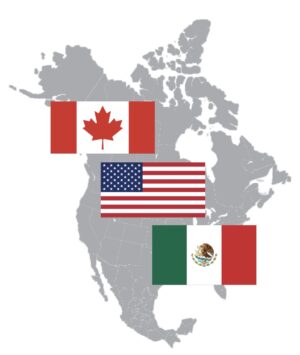 US President Trump could decide next year to withdraw from the Canada-United States-Mexico trade agreement (CUSMA), Politico reported on Thursday, citing U.S. Trade Representative Jamieson Greer. “The president’s view is he only wants deals that are a good deal. The reason why we built a review period into CUSMA was in case we needed to revise it, review it or exit it,” Greer told Politico’s White House bureau chief Dasha Burns in a podcast episode that airs Friday. Greer also raised the idea of negotiating separately with Canada and Mexico and dividing the agreement into two parts in the podcast, adding that he spoke with Trump about that possibility just this week. …Trump on Wednesday said that the CUSMA agreement – which faces an upcoming review- will either be left to expire or another deal will be worked out.
US President Trump could decide next year to withdraw from the Canada-United States-Mexico trade agreement (CUSMA), Politico reported on Thursday, citing U.S. Trade Representative Jamieson Greer. “The president’s view is he only wants deals that are a good deal. The reason why we built a review period into CUSMA was in case we needed to revise it, review it or exit it,” Greer told Politico’s White House bureau chief Dasha Burns in a podcast episode that airs Friday. Greer also raised the idea of negotiating separately with Canada and Mexico and dividing the agreement into two parts in the podcast, adding that he spoke with Trump about that possibility just this week. …Trump on Wednesday said that the CUSMA agreement – which faces an upcoming review- will either be left to expire or another deal will be worked out. 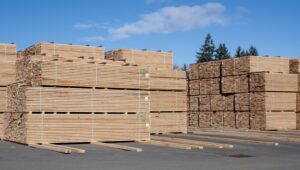 The federal government has rejected an industry request for payouts to softwood producers in Canada on the hook for US duties, fearing that direct intervention would further irritate the US. Canadian softwood producers have paid more than $10-billion since 2017 in accumulated duties, which are cash deposits held in trust by the US that collect interest. The producers expect the US to refund a portion of the duties if and when the two countries resolve the trade dispute. In the meantime, the industry has suggested that the Canadian government make payouts to reflect the present value of anticipated refunds. The two sources said Ottawa would have received any future refunds in exchange for injecting much-needed liquidity into the struggling industry. Ottawa rejected the idea because of fears that such payouts would be viewed as subsidies and become a serious irritant during the wider US trade war, according to a senior government official. [to access the full story a Globe & Mail subscription is required]
The federal government has rejected an industry request for payouts to softwood producers in Canada on the hook for US duties, fearing that direct intervention would further irritate the US. Canadian softwood producers have paid more than $10-billion since 2017 in accumulated duties, which are cash deposits held in trust by the US that collect interest. The producers expect the US to refund a portion of the duties if and when the two countries resolve the trade dispute. In the meantime, the industry has suggested that the Canadian government make payouts to reflect the present value of anticipated refunds. The two sources said Ottawa would have received any future refunds in exchange for injecting much-needed liquidity into the struggling industry. Ottawa rejected the idea because of fears that such payouts would be viewed as subsidies and become a serious irritant during the wider US trade war, according to a senior government official. [to access the full story a Globe & Mail subscription is required]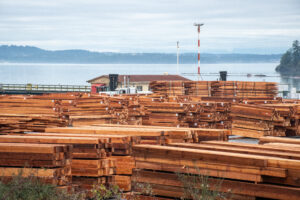 Western Forest Products says the temporary curtailment at its Chemainus sawmill will extend into the new year, while work slowdowns are expected at its other mills across Vancouver Island in December. The WFP curtailment in Chemainus began in June, affecting about 150 workers, with work yet to resume. …Meanwhile, reduced hours are expected at other work sites on the Island later this month. “In the latter half of December, we will take temporary downtime at our Saltair mill in Ladysmith, Duke Point mill in Nanaimo, and Cowichan Bay mill in Duncan,” said Babita Khunkhun, senior director of communications at WFP. “This will involve reduced operating hours, an extended holiday break and adjusted shift schedules.” Khunkhun says regular operations are expected to resume at all of those mills – except for Chemainus – on Jan. 6 “depending on market conditions and available log supply.”
Western Forest Products says the temporary curtailment at its Chemainus sawmill will extend into the new year, while work slowdowns are expected at its other mills across Vancouver Island in December. The WFP curtailment in Chemainus began in June, affecting about 150 workers, with work yet to resume. …Meanwhile, reduced hours are expected at other work sites on the Island later this month. “In the latter half of December, we will take temporary downtime at our Saltair mill in Ladysmith, Duke Point mill in Nanaimo, and Cowichan Bay mill in Duncan,” said Babita Khunkhun, senior director of communications at WFP. “This will involve reduced operating hours, an extended holiday break and adjusted shift schedules.” Khunkhun says regular operations are expected to resume at all of those mills – except for Chemainus – on Jan. 6 “depending on market conditions and available log supply.”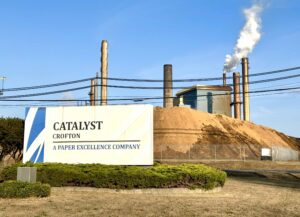 When it comes to what ultimately lies behind Crofton’s impending closure, previous BC Liberal and NDP governments past and present all have much to answer for. Both were at the helm as tumultuous changes rocked BC’s forestry sector. And both did little of consequence in response. The result is not only pain for workers and their families, but a big economic hit for local government. …The first change that governments ignored was the disintegration of what were once highly integrated forest companies. At one point, each of B.C.’s three remaining coastal pulp mills — Crofton, Harmac and Howe Sound — were part of a continuous production chain owned by the same company. In the case of Harmac and Crofton, that company was MacMillan Bloedel, while Howe Sound’s pulp mill was co-owned by Canfor. With integrated companies, all aspects of production from the tree standing in the forest to final products were linked.
When it comes to what ultimately lies behind Crofton’s impending closure, previous BC Liberal and NDP governments past and present all have much to answer for. Both were at the helm as tumultuous changes rocked BC’s forestry sector. And both did little of consequence in response. The result is not only pain for workers and their families, but a big economic hit for local government. …The first change that governments ignored was the disintegration of what were once highly integrated forest companies. At one point, each of B.C.’s three remaining coastal pulp mills — Crofton, Harmac and Howe Sound — were part of a continuous production chain owned by the same company. In the case of Harmac and Crofton, that company was MacMillan Bloedel, while Howe Sound’s pulp mill was co-owned by Canfor. With integrated companies, all aspects of production from the tree standing in the forest to final products were linked.

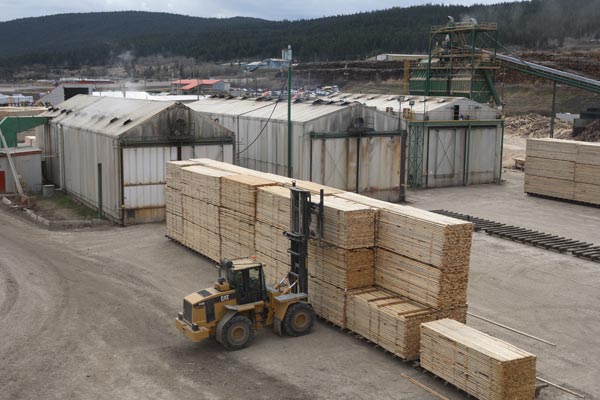






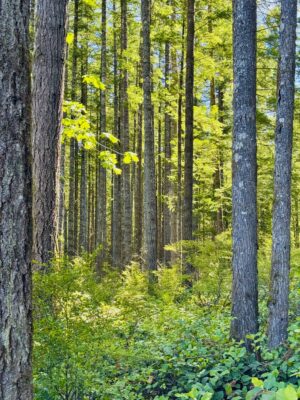 MANCHESTER, Tennessee – Several US sawmills are struggling to stay open after industry leaders said years of trade uncertainty have drained export markets and tightened margins. The Hardwood Federation estimates at least one sawmill is going out of business every week. Additionally, the National Hardwood Lumber Association (NHLA) reported that more than 4% of U.S. sawmills have been lost due to closures and consolidations. The equipment from those sawmills ends up in a growing pile of auction fliers on Johnny Evans’ desk at the Evans Lumber in Manchester, Tennessee. However, Evans is desperate to save his sawmill from being auctioned off due to ongoing trade talks. …Evans said a lot of this goes back to trade tensions that began in 2018, during the first Trump administration. That’s when some countries, like China, stopped buying American hardwood in retaliation to President Donald Trump’s tariff policies.
MANCHESTER, Tennessee – Several US sawmills are struggling to stay open after industry leaders said years of trade uncertainty have drained export markets and tightened margins. The Hardwood Federation estimates at least one sawmill is going out of business every week. Additionally, the National Hardwood Lumber Association (NHLA) reported that more than 4% of U.S. sawmills have been lost due to closures and consolidations. The equipment from those sawmills ends up in a growing pile of auction fliers on Johnny Evans’ desk at the Evans Lumber in Manchester, Tennessee. However, Evans is desperate to save his sawmill from being auctioned off due to ongoing trade talks. …Evans said a lot of this goes back to trade tensions that began in 2018, during the first Trump administration. That’s when some countries, like China, stopped buying American hardwood in retaliation to President Donald Trump’s tariff policies.
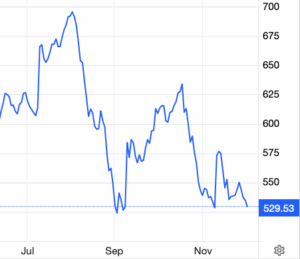 Lumber futures fell toward $530 per thousand board feet, down nearly 10% from November’s peak, as the market contends with pronounced oversupply and lingering weak demand. Mills and distributors continue to carry elevated inventories, a hangover from early 2025 when buyers front-loaded purchases in anticipation of tariffs, leaving the market with a persistent supply overhang. At the same time, US housing starts and building permits remain below last year’s levels, reflecting a prolonged construction slowdown as easing borrowing costs have yet to materialize in higher new building activity and limit near-term consumption of framing lumber. Demand from renovation and new homebuilding also remains subdued, with housing-related wood products consumption estimated to have declined in 2024 and only a modest recovery expected in 2025.
Lumber futures fell toward $530 per thousand board feet, down nearly 10% from November’s peak, as the market contends with pronounced oversupply and lingering weak demand. Mills and distributors continue to carry elevated inventories, a hangover from early 2025 when buyers front-loaded purchases in anticipation of tariffs, leaving the market with a persistent supply overhang. At the same time, US housing starts and building permits remain below last year’s levels, reflecting a prolonged construction slowdown as easing borrowing costs have yet to materialize in higher new building activity and limit near-term consumption of framing lumber. Demand from renovation and new homebuilding also remains subdued, with housing-related wood products consumption estimated to have declined in 2024 and only a modest recovery expected in 2025. 

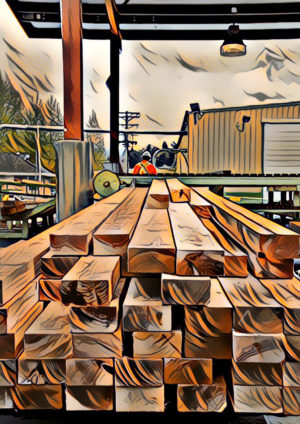 The latest Global Wood Trends report – Softwood Lumber – Tariffs, Turbulence and New Trade Flows to 2030 – says from 2000 to 2024, European lumber output grew slowly at 0.4% per year but still outpaced domestic demand growth. This allowed Europe to expand exports overseas, a trend likely to continue as Russian and Canadian shipments remain constrained. …Production has expanded faster than demand, with exports rising from 10% of output in 2009 to 19% in 2024. Growth has been concentrated in Northern and Central Europe — led by Sweden, Finland, Germany, and Austria — where harvest levels are now close to structural limits. …Global Wood Trends concluded that Europe’s lumber market is entering a period of tightening supply and gradually recovering demand. While production growth is expected to shift toward Northern and Eastern Europe, overall expansion will be limited by structural harvest constraints in Central Europe. Stronger domestic consumption, combined with potentially higher US demand will likely support higher prices for logs and lumber.
The latest Global Wood Trends report – Softwood Lumber – Tariffs, Turbulence and New Trade Flows to 2030 – says from 2000 to 2024, European lumber output grew slowly at 0.4% per year but still outpaced domestic demand growth. This allowed Europe to expand exports overseas, a trend likely to continue as Russian and Canadian shipments remain constrained. …Production has expanded faster than demand, with exports rising from 10% of output in 2009 to 19% in 2024. Growth has been concentrated in Northern and Central Europe — led by Sweden, Finland, Germany, and Austria — where harvest levels are now close to structural limits. …Global Wood Trends concluded that Europe’s lumber market is entering a period of tightening supply and gradually recovering demand. While production growth is expected to shift toward Northern and Eastern Europe, overall expansion will be limited by structural harvest constraints in Central Europe. Stronger domestic consumption, combined with potentially higher US demand will likely support higher prices for logs and lumber. 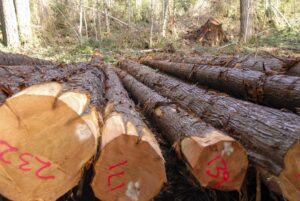 Sweden’s Green Business Index declined in the fourth quarter of 2025 as forestry and crop farming weakened, according to data from the Federation of Swedish Farmers. The total index fell to 100.7 from 106.5 in the previous quarter, marking a broad slowdown across several agricultural industries. The forestry subindex recorded the largest fall, dropping by 19 points to 97.6, its lowest level since spring 2020. The decline reflects weaker export demand, lower prices for sawn wood and pulp, and a soft U.S. dollar that reduced export revenues. New tariffs on Swedish wood products to the United States and a slower global economy further limited profitability. LRF reports that sawmills and pulp producers have experienced tightening margins, while forest owners face lower returns and are reducing harvesting activity.
Sweden’s Green Business Index declined in the fourth quarter of 2025 as forestry and crop farming weakened, according to data from the Federation of Swedish Farmers. The total index fell to 100.7 from 106.5 in the previous quarter, marking a broad slowdown across several agricultural industries. The forestry subindex recorded the largest fall, dropping by 19 points to 97.6, its lowest level since spring 2020. The decline reflects weaker export demand, lower prices for sawn wood and pulp, and a soft U.S. dollar that reduced export revenues. New tariffs on Swedish wood products to the United States and a slower global economy further limited profitability. LRF reports that sawmills and pulp producers have experienced tightening margins, while forest owners face lower returns and are reducing harvesting activity. 


 NOOTKA SOUND, BC — Optimism for the future of Chinook salmon is swimming up Muchalat River near the town of Gold River, BC in Mowachaht/Muchalaht First Nations (MMFN) territory. Kent O’Neill, of the Nootka Sound Watershed Society (NSWS), says he observed hundreds of fish using a newly restored gravel spawning pad this fall. …Navigating a storm of challenges from historical logging practices to droughty summers, Chinook salmon in the region were assessed as Threatened by the Committee on the Status of Endangered Wildlife in Canada in 2020. To revive local Chinook salmon stocks, a collective effort led by NSWS, Ecofish Research, a Trinity Consultants Canada team, MMFN and the Pacific Salmon Foundation (PSF) was hatched. …Western Forest Products (WFP) also played a major role by providing the gravel and access to the forest service roads. “We wouldn’t have been able to do this project without WFP,” said O’Neill.
NOOTKA SOUND, BC — Optimism for the future of Chinook salmon is swimming up Muchalat River near the town of Gold River, BC in Mowachaht/Muchalaht First Nations (MMFN) territory. Kent O’Neill, of the Nootka Sound Watershed Society (NSWS), says he observed hundreds of fish using a newly restored gravel spawning pad this fall. …Navigating a storm of challenges from historical logging practices to droughty summers, Chinook salmon in the region were assessed as Threatened by the Committee on the Status of Endangered Wildlife in Canada in 2020. To revive local Chinook salmon stocks, a collective effort led by NSWS, Ecofish Research, a Trinity Consultants Canada team, MMFN and the Pacific Salmon Foundation (PSF) was hatched. …Western Forest Products (WFP) also played a major role by providing the gravel and access to the forest service roads. “We wouldn’t have been able to do this project without WFP,” said O’Neill.
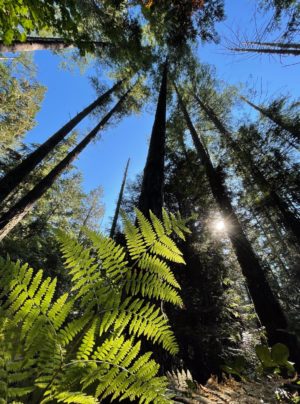 A BC Resource Sector Coalition says current federal and provincial policymaking has become unpredictable enough to justify an immediate pause on all implementation and action under Declaration on the Rights of Indigenous Peoples Act (DRIPA). …“We write to you on behalf of thousands of British Columbians whose livelihoods, communities, and futures are tied to the natural resource sector. Today, those livelihoods are at risk,” the letter begins. “A series of federal and provincial policy decisions have destabilized the industries that sustain our province and are eroding the economic foundations of British Columbia.” …The coalition is composed of a cross-industry membership spanning land and marine activity: BCCA, Geoduck Underwater Harvesters Association, ICBA, Deep Sea Trawlers Association of BC, Guide Outfitters Association of British Columbia, Pacific Prawn Fishermen’s Association, North West Loggers Association, and the Council of Marine Carriers.
A BC Resource Sector Coalition says current federal and provincial policymaking has become unpredictable enough to justify an immediate pause on all implementation and action under Declaration on the Rights of Indigenous Peoples Act (DRIPA). …“We write to you on behalf of thousands of British Columbians whose livelihoods, communities, and futures are tied to the natural resource sector. Today, those livelihoods are at risk,” the letter begins. “A series of federal and provincial policy decisions have destabilized the industries that sustain our province and are eroding the economic foundations of British Columbia.” …The coalition is composed of a cross-industry membership spanning land and marine activity: BCCA, Geoduck Underwater Harvesters Association, ICBA, Deep Sea Trawlers Association of BC, Guide Outfitters Association of British Columbia, Pacific Prawn Fishermen’s Association, North West Loggers Association, and the Council of Marine Carriers.

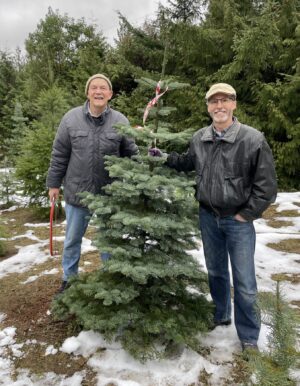 TEXAS — At Santa’s Christmas Trees in Grapevine, owner Kevin Keck has a simple motto: “Every tree deserves a home, and every home deserves a tree.” To keep people happy in a challenging economy, he has not raised his prices. …Part of why he’s able to keep his prices down is that his trees aren’t impacted by tariffs. “No, our trees come from Oregon, so they’re all United States-grown and shipped,” Keck said. “So, the tariffs won’t affect us any.”…But artificial trees are impacted. According to the National Christmas Tree Association, about 80% of fake trees in the US are manufactured in China. Some U.S. importers say those tariffs could raise the prices on trees by 10-20%. Keck thinks that the increase will make more people consider live trees.
TEXAS — At Santa’s Christmas Trees in Grapevine, owner Kevin Keck has a simple motto: “Every tree deserves a home, and every home deserves a tree.” To keep people happy in a challenging economy, he has not raised his prices. …Part of why he’s able to keep his prices down is that his trees aren’t impacted by tariffs. “No, our trees come from Oregon, so they’re all United States-grown and shipped,” Keck said. “So, the tariffs won’t affect us any.”…But artificial trees are impacted. According to the National Christmas Tree Association, about 80% of fake trees in the US are manufactured in China. Some U.S. importers say those tariffs could raise the prices on trees by 10-20%. Keck thinks that the increase will make more people consider live trees.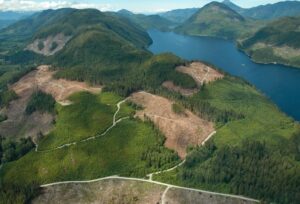 Retired federal wildlife surveyor Erich Reeder… has seen centuries-old forests targeted for destruction as President Donald Trump’s administration accelerates logging on federal lands nationwide. Earlier this year, loggers cleared out most of the forest in Galagher Canyon, part of a federal timber sale an hour south of Eugene, Oregon. …“The Trump administration is ordering the last of our publicly-owned mature and old-growth forests to be cut off and sold,” Reeder, 59, said. …Legal and political battles are heating up between Trump, who is eager to bolster the timber industry as part of his effort to create thousands of jobs and reduce the risk of wildfire, and environmentalists who are keen to protect ancient forests and the endangered wildlife that depend on them. …At least 27 court battles over federal logging and endangered species are unfolding from California to Washington, DC. Seven cases are challenging logging in eastern states.
Retired federal wildlife surveyor Erich Reeder… has seen centuries-old forests targeted for destruction as President Donald Trump’s administration accelerates logging on federal lands nationwide. Earlier this year, loggers cleared out most of the forest in Galagher Canyon, part of a federal timber sale an hour south of Eugene, Oregon. …“The Trump administration is ordering the last of our publicly-owned mature and old-growth forests to be cut off and sold,” Reeder, 59, said. …Legal and political battles are heating up between Trump, who is eager to bolster the timber industry as part of his effort to create thousands of jobs and reduce the risk of wildfire, and environmentalists who are keen to protect ancient forests and the endangered wildlife that depend on them. …At least 27 court battles over federal logging and endangered species are unfolding from California to Washington, DC. Seven cases are challenging logging in eastern states.


 TORONTO — Environmental experts are calling out the City of Toronto for not including a what they say is a key climate tool in its five-year climate action plan. The Toronto Environmental Alliance is highlighting the lack of building emission performance standards (BEPS) in the plan. BEPS are regulations that set emission limits for new and existing buildings. How-Sen Chong, TEA’s climate campaigner, such standards are one of the most significant policy tools as they would help the city cut emissions more efficiently. …Bryan Purcell, at the Atmospheric Fund, said, “Buildings are the largest source of GHG emissions in Toronto, accounting for over half of the emissions,” he said. “Reducing emissions from buildings is absolutely key to reaching the city’s climate targets.” …Chong “we’re hoping city council recognizes how important this is because so much of the city’s emissions are coming from the building sector,” he said.
TORONTO — Environmental experts are calling out the City of Toronto for not including a what they say is a key climate tool in its five-year climate action plan. The Toronto Environmental Alliance is highlighting the lack of building emission performance standards (BEPS) in the plan. BEPS are regulations that set emission limits for new and existing buildings. How-Sen Chong, TEA’s climate campaigner, such standards are one of the most significant policy tools as they would help the city cut emissions more efficiently. …Bryan Purcell, at the Atmospheric Fund, said, “Buildings are the largest source of GHG emissions in Toronto, accounting for over half of the emissions,” he said. “Reducing emissions from buildings is absolutely key to reaching the city’s climate targets.” …Chong “we’re hoping city council recognizes how important this is because so much of the city’s emissions are coming from the building sector,” he said.